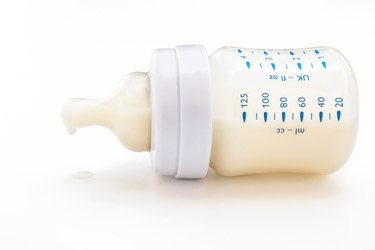Study: Other Factors May Be Responsible for the Health Benefits Ascribed to Breastfeeding
A new study suggests that other characteristics of the women and families who breastfeed may be responsible for improving their infants’ health—not just the act of nursing or breast milk itself.

Recently, Rewire has been reporting on initiatives around the world designed to increase the number of women who breastfeed and the length of time for which they do it. A pilot program in a low-income part of Britain, for example, is offering to pay mothers in the form of gift cards if they exclusively breastfeed their infants for six months. The United Arab Emirates took the drastic measure of legally mandating two years of breastfeeding. And here in the United States, the American Pediatric Association has a policy that pediatricians should not provide materials that promote formula feeding, such as gift bags, industry-written pamphlets, or coupons.
All of these programs and policies were implemented based on the underlying belief that breastfeeding provides numerous benefits to the health and well-being of babies that cannot be achieved through other means. These beliefs did not develop out of thin air—they are based on years of research. But a new study suggests that it may be other characteristics of the women and families who breastfeed that improve their infants’ health, rather than the act of nursing or the breast milk itself.
Researchers from Ohio State University analyzed data on more than 8,000 young people, many of whom were siblings and 25 percent of whom were from sets of siblings in which at least one was breastfed and at least one was bottle-fed. This inclusion of siblings with “discordant” feeding patterns is what the authors say is innovative about this study, because it attempts to account for those characteristics of mothers and families, other than breastfeeding, that are known to affect health outcomes. Lead author Cynthia Colen said in a press release, “Many previous studies suffer from selection bias. They either do not or cannot statistically control for factors such as race, age, family income, mother’s employment—things we know that can affect both breast-feeding and health outcomes.” Women with higher income and better employment are more likely to nurse, and children of women with higher income and better employment are more likely to have positive health outcomes.
Colen and her team looked at 11 indicators of better health that have, in previous studies, been credited to breastfeeding, including body mass index (BMI), obesity, asthma, hyperactivity, parental attachment, and behavior compliance as well as scores predicting academic achievement in vocabulary, reading, math, intelligence, and scholastic competence. As expected, the analyses of the samples when compared across families suggested that breastfeeding resulted in better outcomes than bottle-feeding in most of these measures.
Interestingly, though, when the sample was restricted to siblings who lived in the same families but were fed differently as infants, the positive effect of breastfeeding all but disappeared on ten out of the 11 indicators. The only one that continued to have significant differences was asthma, though not in the direction one would expect. Children who were breastfed as babies seem to be at increased risk for this breathing disorder. The authors, however, suggest that some of this difference may be a result of the data on asthma, which was based on self-report rather than an actual diagnosis.
Though this is just one study, it does cast some doubts on the recent emphasis on breastfeeding as the best or only acceptable way to care for an infant. Moreover, it suggests that programs and policies designed to promote breastfeeding by mandating it, offering coupons, or making formula harder to obtain may be missing the mark. Colen believes that we need to “understand that breast-feeding might be very difficult, even untenable, for certain groups of women. Rather than placing the blame at their feet, let’s be more realistic about what breastfeeding does and doesn’t do.”
She adds, “I’m not saying breast-feeding is not beneficial, especially for boosting nutrition and immunity in newborns. But if we really want to improve maternal and child health in this country, let’s also focus on things that can really do that in the long term—like subsidized day care, better maternity leave policies and more employment opportunities for low-income mothers that pay a living wage, for example.”
